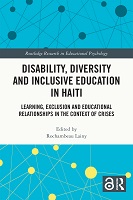Chapter 8 Learning of written language
Proposal review
A study focused on a group of deaf and hard-of-hearing students in Haiti
Author(s)
LAINY, Rochambeau
Pierre, Ralphson
Language
EnglishAbstract
The deaf and hard-of-hearing sometimes experience constraints that differ from those of hearing people; plus, when this physiological state (deafness) coincides with other disorders, learning to write becomes exceptionally difficult.
The main interest of this chapter includes the strategies that hard-of-hearing and deaf (non-hearing) children devise to learn to write and how they use writing in the development of knowledge in the Haitian context. It is a matter of understanding how these children manage to learn to read and write, and of analyzing impacts of judgements on their school performances. As deafness, seen in particular from the angle of sensorimotor disorder is described as phenomenon that impose social specific limitations on children, this chapter is to study the impacts of pedagogical practices on the learning process of written language. The deafness as a characteristic of a community of people that are culturally and linguistically different community, is notably studied.
Keywords
Context, Crises, Disability, Diversity, Education, Educational, Exclusion, Haiti, Inclusive, Lainy, Rochambeau, Learning, RelationshipsDOI
10.4324/b23239-13ISBN
9781032389462, 9781032389479, 9781003347644Publisher
Taylor & FrancisPublisher website
https://taylorandfrancis.com/Publication date and place
2023Imprint
RoutledgeClassification
Education
Educational psychology
Educational strategies and policy: inclusion


 Download
Download